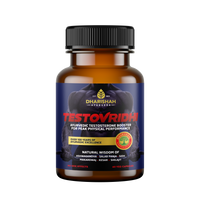Boosting Male Hormones: Effective Ways to Increase Testosterone Levels
Understanding Testosterone
Testosterone is a crucial hormone for men, playing a vital role in various bodily functions. It affects muscle mass, bone density, fat distribution and red blood cell production. As men age, testosterone levels naturally decline, leading many to seek ways to maintain or increase their testosterone levels.
What is Testosterone?
Testosterone is the primary male sex hormone produced mainly in the testicles. It's responsible for:
-
Development of male sexual characteristics
-
Muscle and bone strength
-
Sperm production
-
Libido and sexual function
-
Mood regulation
-
Cognitive function
Normal Testosterone Levels
Testosterone levels vary throughout the day and are typically highest in the morning. Normal levels for adult men range from 300 to 1,000 nanograms per deciliter (ng/dL). However, what's considered "normal" can differ based on age, overall health, and individual factors.
Natural Methods to Increase Testosterone
Many men are interested in natural ways to boost their testosterone levels. Here are some effective strategies:
1. Optimize Your Diet
Eating a balanced diet rich in proteins, healthy fats, and essential nutrients can support testosterone production. Some foods that may help include:
-
Eggs
-
Fatty fish (salmon, tuna, mackerel)
-
Oysters
-
Beef
-
Beans and legumes
-
Nuts and seeds
2. Regular Exercise
Physical activity, especially resistance training and high-intensity interval training (HIIT), can boost testosterone levels. Aim for at least 150 minutes of moderate-intensity exercise or 75 minutes of vigorous-intensity exercise per week.
3. Maintain a Healthy Weight
Obesity is linked to lower testosterone levels. Losing excess weight through a combination of diet and exercise can help increase testosterone production.
4. Get Enough Sleep
Quality sleep is crucial for hormone production, including testosterone. Aim for 7-9 hours of sleep per night.
5. Manage Stress
Chronic stress can lead to elevated cortisol levels, which may suppress testosterone production. Practice stress-reduction techniques like meditation, deep breathing, or yoga.
Lifestyle Changes for Higher Testosterone
Making certain lifestyle adjustments can significantly impact testosterone levels:
Limit Alcohol Consumption
Excessive alcohol intake can lower testosterone levels. If you choose to drink, do so in moderation.
Quit Smoking
Smoking has been linked to lower testosterone levels. Quitting can help improve overall health and hormone balance.
Reduce Exposure to Endocrine Disruptors
Some chemicals found in plastics and personal care products can interfere with hormone production. Choose natural products when possible and avoid heating food in plastic containers.
Dietary Choices for Optimal Testosterone Production
A nutrient-rich diet is essential for maintaining healthy testosterone levels. Focus on:
Zinc-Rich Foods
Zinc is crucial for testosterone production. Good sources include:
-
Oysters
-
Beef
-
Pumpkin seeds
-
Lentils
-
Chickpeas
Vitamin D
Vitamin D is linked to testosterone production. While sunlight is the best source, you can also get it from:
-
Fatty fish
-
Egg yolks
-
Fortified dairy products
Healthy Fats
Adequate fat intake is necessary for hormone production. Include sources of healthy fats like:
-
Avocados
-
Nuts and seeds
-
Olive oil
-
Fatty fish
Exercise and Testosterone Levels
Regular physical activity is one of the most effective ways to boost testosterone naturally. Here's how different types of exercise can help:
Resistance Training
Lifting weights or using resistance bands can significantly increase testosterone levels. Focus on compound exercises that work multiple muscle groups, such as:
-
Squats
-
Deadlifts
-
Bench presses
-
Pull-ups
High-Intensity Interval Training (HIIT)
Short bursts of intense exercise followed by brief recovery periods can boost testosterone production. Try incorporating HIIT workouts into your routine 2-3 times per week.
Cardiovascular Exercise
While not as effective as resistance training for boosting testosterone, regular cardio can help maintain a healthy weight and improve overall health, indirectly supporting hormone balance.
The Role of Sleep in Testosterone Production
Quality sleep is crucial for maintaining healthy testosterone levels. Here's why:
Sleep and Hormone Production
Most testosterone release occurs during sleep. Insufficient or poor-quality sleep can disrupt this process, leading to lower testosterone levels.
Tips for Better Sleep
-
Stick to a consistent sleep schedule
-
Create a relaxing bedtime routine
-
Keep your bedroom cool, dark, and quiet
-
Avoid screens for at least an hour before bed
-
Limit caffeine and alcohol intake, especially in the evening
Stress Management and Testosterone
Chronic stress can negatively impact testosterone levels. Here are some effective stress-reduction techniques:
Meditation and Mindfulness
Regular meditation practice can help lower stress hormones and potentially boost testosterone levels.
Physical Activity
Exercise is an excellent stress-reliever and can simultaneously increase testosterone production.
Social Connections
Maintaining strong social relationships can help reduce stress and support overall well-being, indirectly benefiting hormone balance.
Supplements and Herbal Remedies
While a balanced diet should be the primary source of nutrients, some supplements may help support testosterone production:
Dharishah Ayurveda's Testovridhi Capsules
Testosterone booster ayurvedic Testovridhi Capsules from Dharishah Ayurveda are an Ayurvedic formulation designed to support male reproductive health and potentially boost testosterone levels naturally.
Other Supplements to Consider
-
Vitamin D
-
Zinc
-
Magnesium
-
Ashwagandha
-
Fenugreek
Always consult with a healthcare professional before starting any new supplement regimen.
Medical Treatments for Low Testosterone
If natural methods and lifestyle changes don't sufficiently increase testosterone levels, medical treatments may be necessary:
Testosterone Replacement Therapy (TRT)
TRT involves administering synthetic testosterone through injections, gels, or patches. This treatment is typically reserved for men with clinically low testosterone levels and should only be done under medical supervision.
Other Medications
In some cases, doctors may prescribe medications to address underlying conditions affecting testosterone production, such as issues with the pituitary gland.
Monitoring and Maintaining Healthy Testosterone Levels
Regular check-ups and blood tests can help you monitor your testosterone levels and overall health. Here are some tips for maintaining healthy testosterone levels long-term:
-
Continue with a balanced diet and regular exercise routine
-
Manage stress effectively
-
Prioritize quality sleep
-
Limit alcohol consumption and avoid smoking
-
Consider natural supplements like testosterone booster in Ayurveda as Testovridhi Capsules
-
Consult with healthcare professionals regularly, especially if you're experiencing symptoms of low testosterone
By following these guidelines and making informed choices about your health, you can support healthy testosterone levels naturally. Remember, everyone's body is different, so what works best for you may require some experimentation and guidance from healthcare professionals.
For more information on natural approaches to men's health, visit Dharishah Ayurveda and explore their range of Ayurvedic products designed to support overall well-being and hormonal balance.












